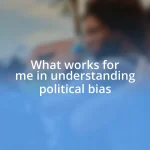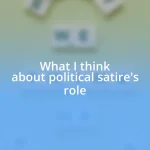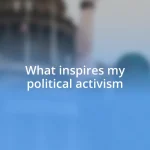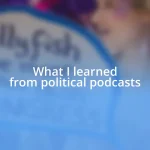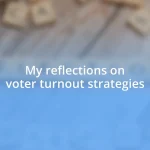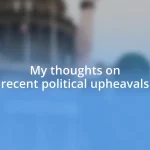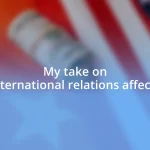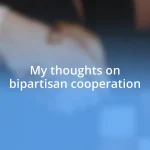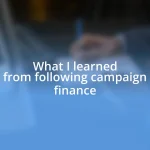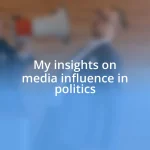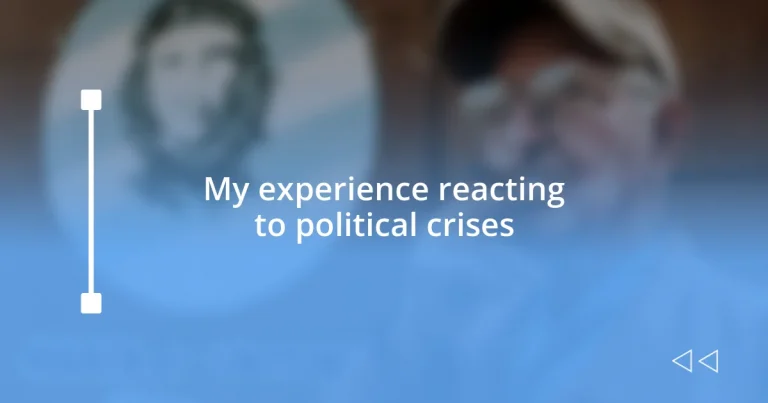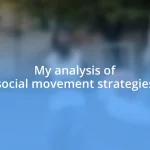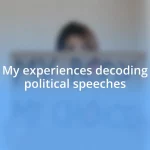Key takeaways:
- Political crises can stem from deep-rooted issues, leading to emotional turmoil and a feeling of lost agency among citizens.
- Recognizing signs of political change often starts with community conversations, shifts in media framing, and active participation in social movements.
- Taking proactive steps such as organizing community actions, engaging in dialogue, and reflecting on experiences can empower individuals and foster resilience during turbulent times.
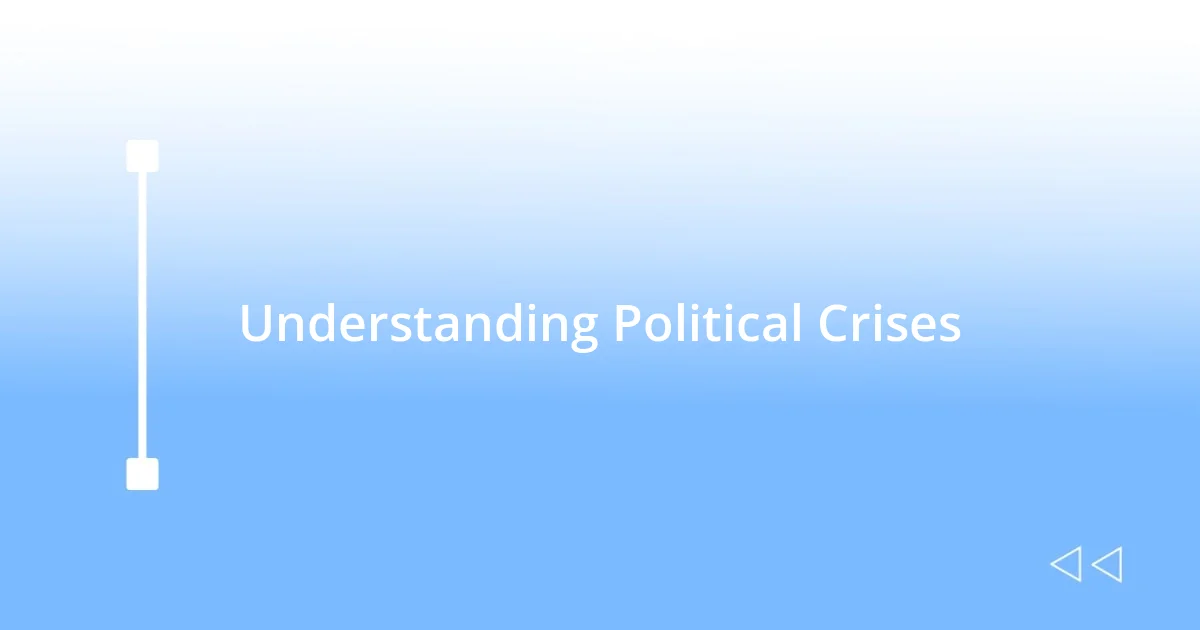
Understanding Political Crises
Political crises are periods of intense conflict and uncertainty that can grip a nation, sometimes emerging from seemingly small events. I remember vividly the palpable tension in my community during a recent election dispute; it felt like the air was buzzing with anxiety. Isn’t it fascinating how a single political event can pivot an entire society into chaos?
These crises often stem from deep-rooted issues such as economic distress, social inequality, or erupting corruption scandals. I once found myself in a heated discussion with friends about our local government’s decisions, realizing that our frustrations were not just from the events themselves but also from their implications on our lives. How do we convey our emotions when our very livelihoods are at stake?
The emotional landscape during these times is equally complex, filled with fear, anger, and sometimes even hopelessness. I often felt overwhelmed, wondering how ordinary citizens can regain a sense of agency in a climate that seems so out of control. This reflection made me appreciate the power of community and dialogue in navigating the storms of political turbulence.
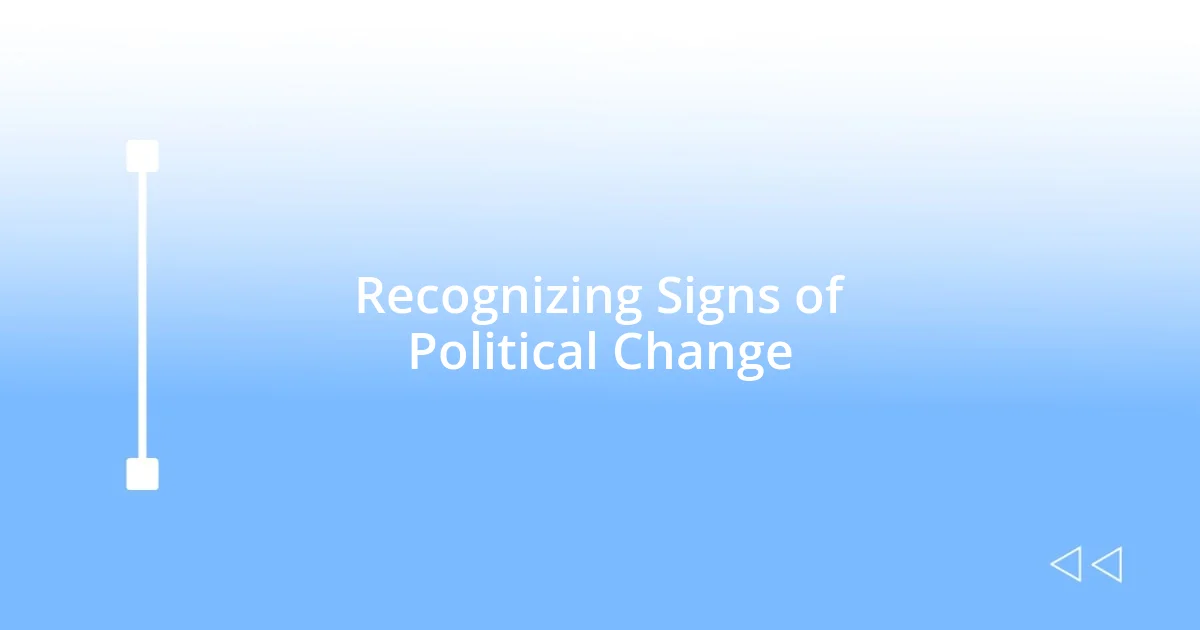
Recognizing Signs of Political Change
Recognizing signs of political change can often feel like tuning into a subtle, often muffled frequency. For me, the first inkling usually comes from the conversations swirling in local coffee shops or community gatherings. I remember once overhearing a discussion about a proposed policy that nobody seemed to support—it marked a shift in sentiment that felt palpable. It’s like you can sense a tide turning, and you begin to wonder what waves it will bring.
Another key factor is the media landscape. During times of political upheaval, I’ve noticed a distinct shift in how the news frames issues. I recall a period when an investigative piece on government corruption captured public attention, sparking a flurry of discussions online. The posts and memes that were shared weren’t just about the incident; they revealed deeper frustrations with the status quo. It’s almost as if the collective frustration surfaces much like a pressure cooker about to blow.
Finally, social movements often serve as early warning signs of change. Once, I joined a peaceful protest advocating for social justice, and the energy was electric. You could feel the resolve in the crowd, and it was refreshing to witness so many voices united for a common cause. This experience convinced me that grassroots movements can be powerful indicators of underlying societal shifts. They encapsulate the essence of a community yearning for change, often long before the headlines catch up.
| Signs of Political Change | Personal Experience |
|---|---|
| Community Conversations | Listening to feedback at local gatherings sparked concern for policy changes. |
| Media Framing | A shift in news narratives during a corruption scandal revealed public sentiment. |
| Social Movements | Participating in protests showed the unity and urgency of community voices. |
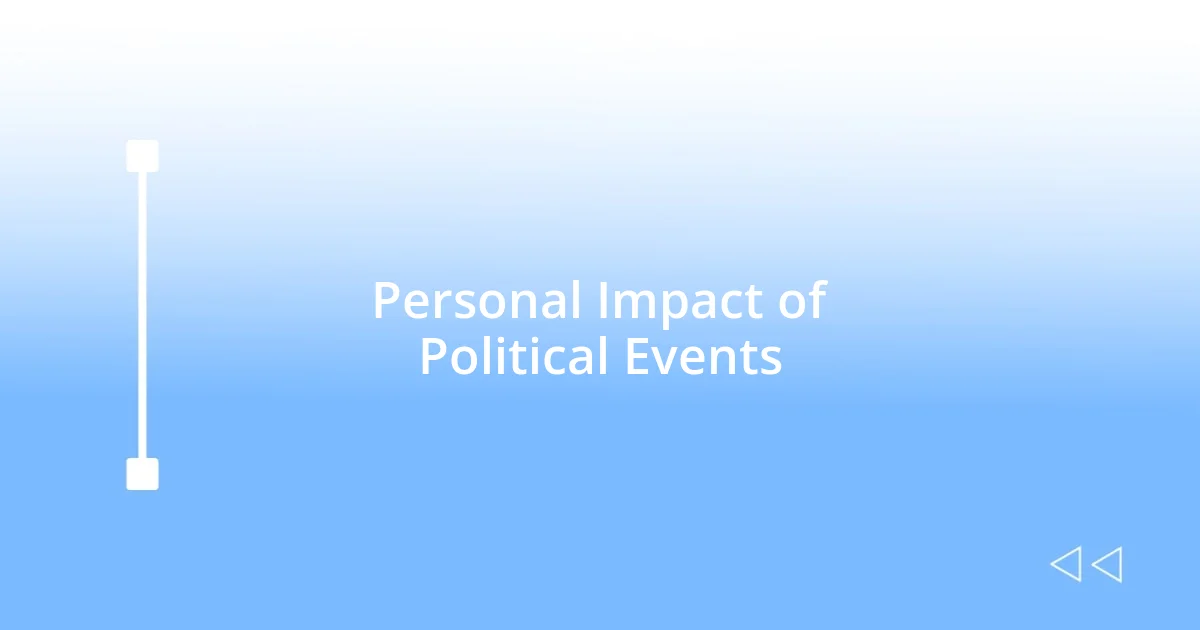
Personal Impact of Political Events
The personal impact of political events can be striking and often unexpected. I remember one afternoon, scrolling through my feeds as word of a sudden policy change broke—my heart sank. It was like a wave of uncertainty hit me, combined with the realization of what that change could mean for my job security. Suddenly, the abstract nature of politics felt incredibly personal. I found myself battling anxiety, realizing that decisions made miles away could disrupt my daily routine and alter my future.
• I often felt torn between staying informed and protecting my mental well-being, as constant news updates triggered a cycle of stress.
• Conversations with friends became laced with frustration, as we dissected how each political decision encroached upon our lives.
• The urgency to act grew stronger within me; attending town hall meetings felt like a way to reclaim some agency.
The emotional weight during these events can be isolating. When a local leader faced scandal, I watched as trust within my community crumbled. It was disheartening to see neighbors, once united, now divisively choosing sides. I participated in numerous discussions, hoping to foster understanding, but deep down, I felt exhaustion setting in. It struck me that navigating these crises is not just about politics; it’s about people, their fears, and their hopeful aspirations for a better world.
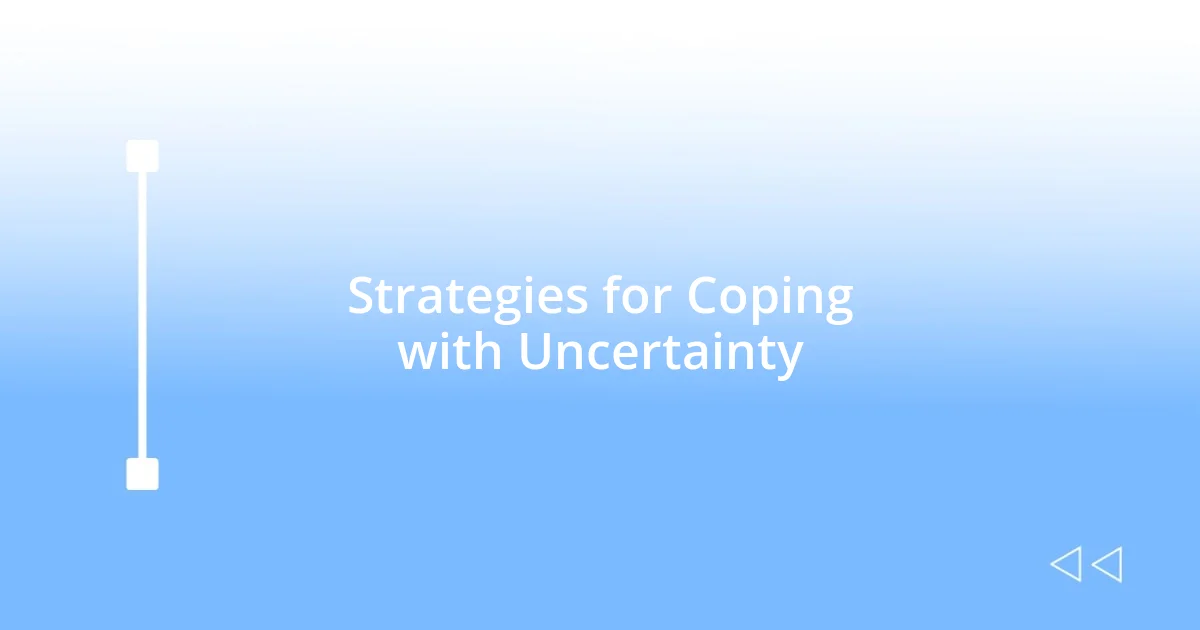
Strategies for Coping with Uncertainty
Engaging with uncertainty during political crises can often feel overwhelming. I vividly recall a time when I faced a significant policy shift affecting my neighborhood. To cope, I created a small support group with friends, where we shared our concerns and brainstormed actionable steps. It became a safe space to verbalize our anxieties, ultimately transforming our fear into proactive discussions. Could pooling our thoughts and worries actually empower us? For me, the answer was a resounding yes.
Staying grounded in the present is another effective strategy. I’ve learned to balance my news consumption—allowing myself a brief daily update while setting boundaries against scrolling endlessly. One evening, after binge-watching a series of alarming news reports, I intentionally stepped outside to enjoy the fresh air and reconnect with nature. It was a reminder that despite the chaos, life continued, and focusing on the present moment brought me a sense of calm that the news simply could not provide.
Finally, seeking out diverse perspectives can truly widen our understanding. I remember attending a community forum where people from various backgrounds shared their experiences. It struck me how different viewpoints illuminated the discussion around impending political changes. By listening actively and engaging in these dialogues, I found clarity amid uncertainty. What if we all sought out those differing opinions? I believe it could foster a deeper sense of community and collective resilience.
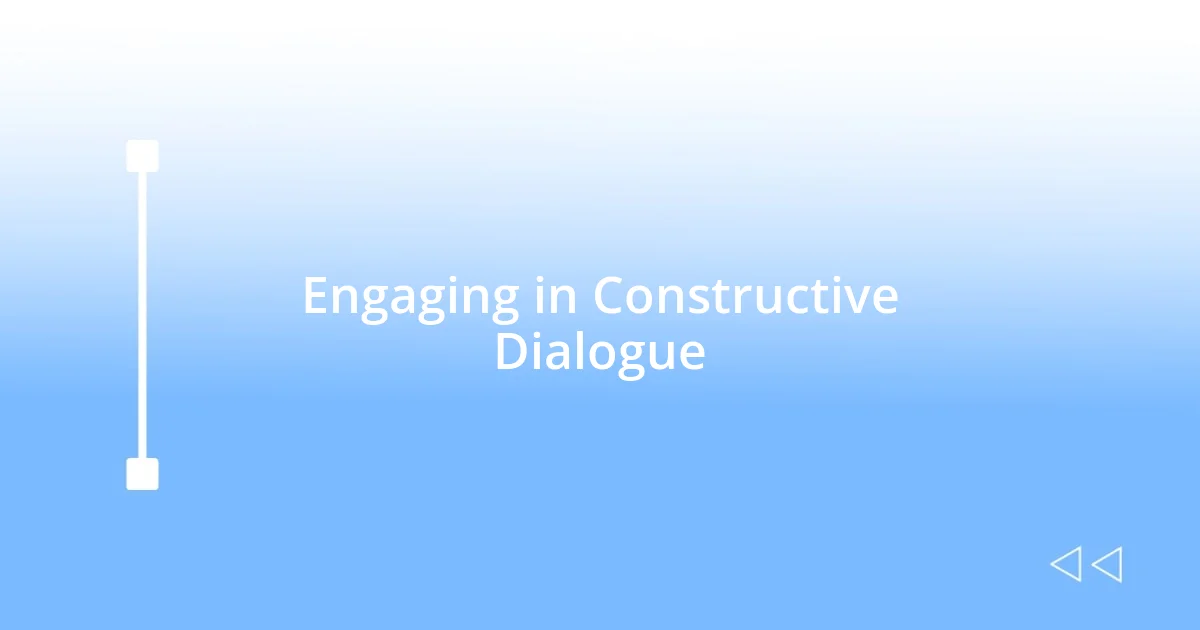
Engaging in Constructive Dialogue
Engaging in constructive dialogue during political crises has been a journey of discovery for me. I vividly recall a heated discussion I had with a colleague who held opposing views on a controversial policy. Instead of allowing frustration to dictate our exchange, I made it a point to listen actively, asking questions to better understand his perspective. It amazed me how a simple act of curiosity transformed our disagreement into a learning opportunity. Why can’t we all approach tough conversations with that mindset?
I’ve also found that sharing personal experiences can guide conversations toward a more empathetic space. For instance, during a town hall meeting, I shared how a proposed law directly impacted my family’s healthcare. The room shifted from an impersonal debate to a heartfelt discussion about human experiences. It’s moments like these that remind me the topic behind the policy often gets lost, overshadowed by angry voices. How often do we forget that people are at the center of these issues?
Moreover, I’ve realized that it’s essential to establish common ground, even with those who don’t share my views. I remember participating in a community coffee chat where we focused on shared values—like community safety and family well-being—regardless of our political affiliations. This approach fostered a stronger bond among us and allowed for dialogue that felt safe and constructive. Could emphasizing our common human experiences be the key to overcoming division? In my experience, it absolutely can.
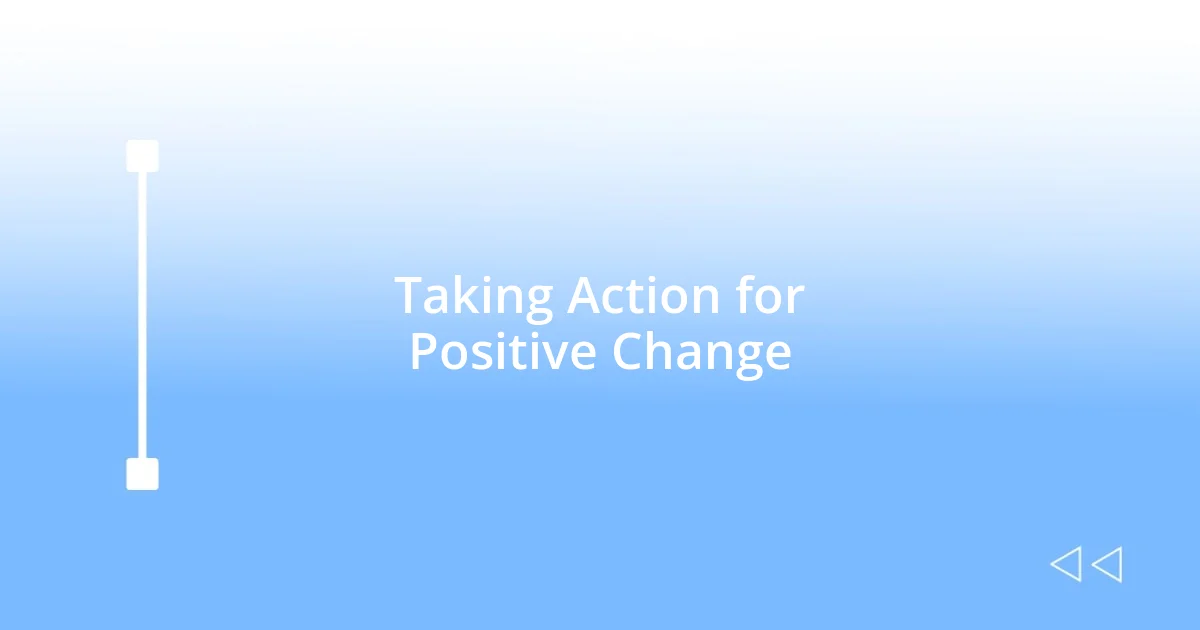
Taking Action for Positive Change
Taking action for positive change requires a proactive mindset. I once organized a community cleanup after a controversial decision led to increased litter in our park. The joy on the faces of my neighbors as we worked side by side was contagious, reminding me that even in the midst of political chaos, grassroots efforts can create a meaningful impact. Don’t you think that collective action can sometimes resonate louder than words?
Participating in local advocacy has also been a rewarding experience for me. During a heated election cycle, I volunteered for a campaign that aligned with my values. Engaging in door-to-door outreach not only helped me connect with my community but also deepened my understanding of the issues they were passionate about. It felt empowering to witness how individual voices, when united, can challenge the status quo. Isn’t it incredible how stepping out of our comfort zones can lead to a ripple effect of change?
Reflecting on the power of education, I took the initiative to host a series of workshops on civic engagement at my local library. I was surprised by the turnout; so many people were eager to learn how to navigate the political landscape more effectively. The energy in that room was palpable as we shared strategies and personal stories of activism. This experience affirmed for me that knowledge is truly transformative. What actions might we take today to strengthen our communities tomorrow?
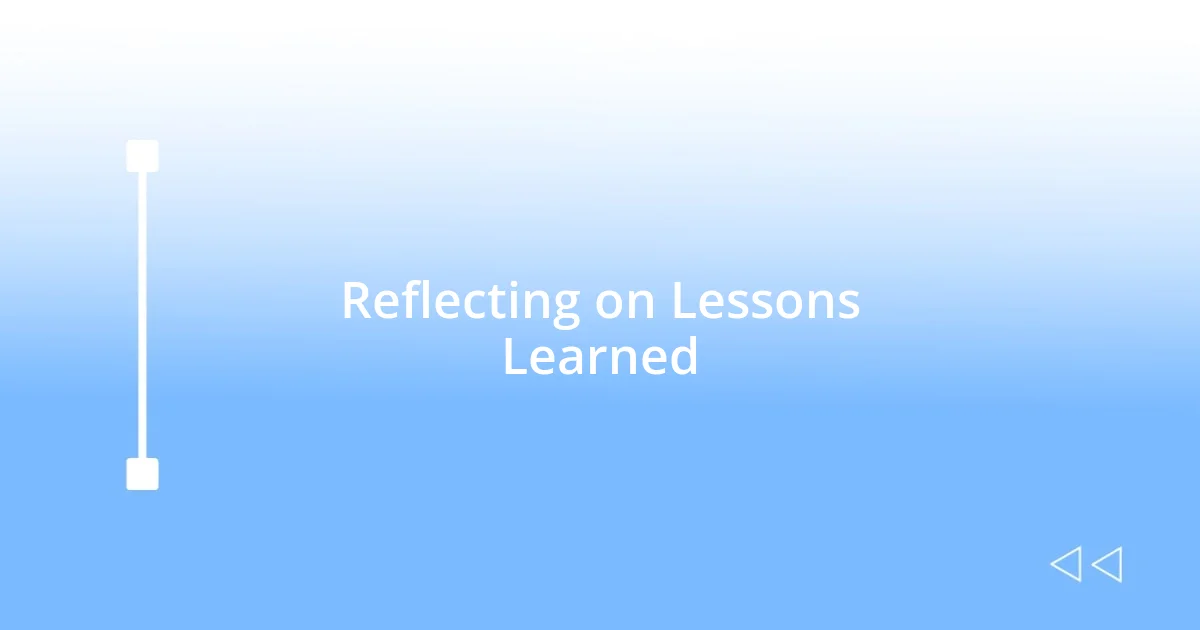
Reflecting on Lessons Learned
Reflecting on lessons learned has often led me to recognize the profound importance of patience in turbulent times. For instance, during a recent town hall meeting, I witnessed a heated exchange that quickly escalated. I made a conscious effort to pause and take a breath before responding. This small act allowed others to reflect, creating a space where stronger emotions settled into more rational thoughts. Have you ever noticed how a moment of calm can shift the trajectory of a conversation?
Another lesson I cherish is the value of vulnerability when discussing sensitive topics. I remember sharing a personal story about how a specific policy had altered my daily life. As I opened up, I noticed others in the room began to share their own experiences. It was astonishing how that mutual vulnerability fostered an atmosphere of trust and understanding. Isn’t it interesting how transparency can bridge seemingly insurmountable divides?
Finally, I’ve come to appreciate the power of time in processing political crises. After a particularly divisive event, I took a step back to reflect on my emotions and reactions. This allowed me to approach future discussions with a clearer mindset, free from the weight of anger. It’s a reminder that sometimes, the best response is to give ourselves permission to pause. How might taking a moment for personal reflection change the way we engage with the complexities of politics?
